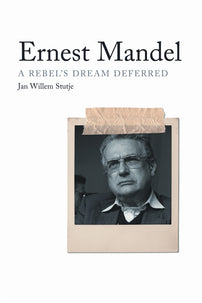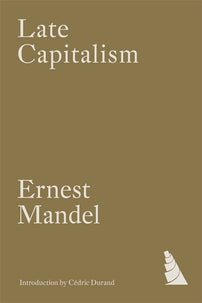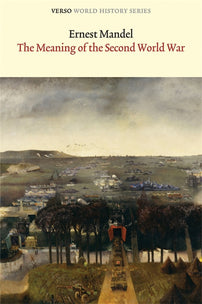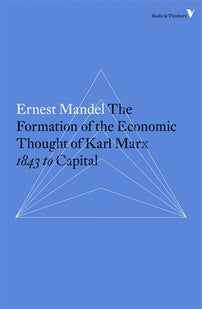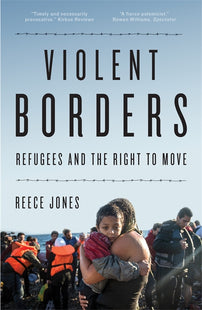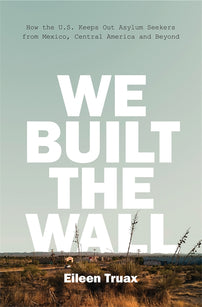Trump v. Hawaii and Kleindienst v. Mandel
Ernest Mandel's biographer describes the Supreme Court decision that kept Mandel out of the United States — and set a precedent for the Muslim travel ban.

In late June, the United States Supreme Court issued a decision in Trump v. Hawaii, ruling to reverse the lower court’s injunction against Presidential Proclamation 9645, the third version of Trump’s Muslim travel ban. In a 5-4 decision, the Court upheld that Trump acted within the presidency’s authority under the Immigration and Nationality Act, and declined to scrutinize whether Trump’s actions were the result of discriminatory “religious animus.”
In this way the judicial system closed its eyes to the Islamophobia apparent in much US executive policy. As Justice Sonia Sotomayor correctly stated in her dissent, this Supreme Court’s decision has a precedent in the 1944 Korematsu v. United States, in which the Court infamously upheld the internment of Japanese-Americans during the Second World War on national security grounds, solely and explicitly on the basis of race.
Writing for the majority, Chief Justice John Roberts focused particularly on the precedent of Kleindienst v. Mandel in 1972, which upheld the Nixon administration’s 1969 denial of a visa to Ernest Mandel, a Belgian Marxist economist and leader of the Fourth International. Mandel had been invited to speak at a conference at Stanford University, and to engage John Kenneth Galbraith, Harvard economist and former US ambassador to India, in a debate over “Technology and the Third World.” Although foreign nationals seeking admission to the United States have no constitutional right to entry, the decision was challenged under the First Amendment, on the grounds that the denial of a visa to Mandel infringed the constitutional rights of the inviting scholars to receive information.
Since the Court has recognized for more than a century that the admission and exclusion of foreign nationals is a “fundamental sovereign attribute exercised by the Government’s political departments largely immune from judicial control,” Roberts argued, referring to the Mandel case, the Justices had to limit their inquiry to the question of whether or nor the Executive gave a “facially legitimate and bona fide” reason for its action. "Mandel’s narrow standard of review has," Roberts said, “'particular force' in admission and immigration cases that overlap with 'the area of national security.'" For one, as he wrote, “[j]udicial inquiry into the national-security realm raises concerns for the separation of powers” by infringing on the President’s foreign policy authority established in the Constitution. For another, “when it comes to collecting evidence and drawing inferences” on questions of national security, “the lack of competence on the part of the courts is marked.” As the Lawfare blog describes:
Such deference is critical, the court explains, in allowing the president the “flexibility” necessary to respond to a rapidly changing immigration and national security landscape… Applying rational basis review, the court agrees to “consider” extrinsic evidence but explains that it will ultimately decide the case based on whether the “policy is plausibly related to the Government’s stated objective” (i.e., protecting the country and improving the vetting processes). Under this lenient standard, the court decisively upholds the policy. The court explains that the policy “is expressly premised on legitimate purposes,” “reflects the results of a worldwide review process undertaken by multiple Cabinet officials and their agencies,” and justifies the inclusion of each country placed on the list.
Trump’s motivation is no less ideological than Nixon’s was in the case of Mandel. The Court, however, ruled that the President had supplied a “facially legitimate and bona fide” reason for its ban. “To Roberts,” Mikund Rathi writes in Socialist Worker, “it was basically decisive that the text says nothing about religion and that the ban includes Venezuela and North Korea, which are not Muslim-majority countries.” He concluded that, on its own, Trump’s Proclamation was justified not by racism and anti-Muslim feeling, but solely by national security considerations, explicitly formulating that the ban is “preventing entry of nationals who cannot be adequately vetted and inducing other nations to improve their practices.”
According to the Court, since Trump waves the banner of “national security”, and limits the ban to “dangerous” countries, he is beyond all suspicion. But given Trump’s open Islamophobia, can anything else be taken seriously as a “bona fide” reason for the order? By giving greater weight to the Executive's authority and ignoring the concerns over discriminatory religious animus, the Supreme Court continued its long history of undemocratic political intervention and blind deference to the national security state. The decision will have not only disastrous practical consequences, it is also a shameless message to people seeking refuge in the US from civil war and sectarian bloodshed that their lives matter less than the remote chance that an American might be killed by a Muslim “terrorist.”
The solidarity movement suffers a major defeat by this travesty of a ruling. With the recent nomination of the ultra-conservative Brett Kavanaugh to succeed Anthony Kennedy, Trump is poised to appoint another Justice to the Supreme Court who can help deliver further legal victories to the white supremacist movement.
In the light of these events it is worth remembering other aspects of Mandel’s 1972 case. First, the rapid proliferation of Mandel’s travel ban in kindred nations, which mimicked the United States’ repressive policy during these revolutionary years. Mandel was not only refused entry into the US, but also West Germany, France, Switzerland, and Australia. The least we can say is that Trump’s anti-immigration policy will easily find imitation within Fortress Europe, whose countries are also marked by the growth of vicious anti-immigrant movements.
Second, the worldwide protests that were mounted in response to Mandel’s travel ban. Banned or not, Mandel would not be stopped and proposed to Galbraith that their meeting proceed via taped contributions, followed by a public telephone debate. This kind of performance stirred public opinion and stimulated protests and mobilizations against Nixon’s reactionary policy. The New York Times editorial page called the ban on Mandel an “idiotic decision” and “a vestige of the restrictive era of the nineteen-fifties.” A committee that included Arno Mayer, Gabriel Kolko, Noam Chomsky, and Susan Sontag recorded their protest. The New York Review of Books and Partisan Review joined in. The Nixon administration had not anticipated so much opposition. US Attorney General John N. Mitchell was grilled about it on Meet the Press. Even the Wall Street Journal questioned the decision: “Legal, but was it wise?”
News media in Europe also paid attention to the issue, and soon a new incident threw fuel on the fire. In April 1970 in Zaventem, home of the Brussels airport, Mandel’s wife was stopped from boarding her flight to New York. Sabena Airlines refused her access because the US consulate had revoked her visa. The papers were full of it. In the Belgian parliament written questions were submitted to the government. Was it a matter of an abhorrent “guilt by association and by family bonds”? Mandel was worried. He was now banned from entering five countries. He was afraid that Britain and Italy would be next. The Sunday Telegraph in England had speculated over whether he was connected with the IRA. Like Newsweek, the Belgian paper La Libre Belgique associated Mandel with terrorism. In July 1975 the US Senate Subcommittee for Internal Security branded Mandel “the major theoretician of terrorism for the Fourth International.” A highly placed security official expressed amazement that Mandel had been refused entry into the US only because in a previous visa request he had violated visa conditions: reportedly because he had collected money for jailed French students on an earlier visit. “No one has raised the question of Mandel being a major advocate of worldwide terrorism,” the official complained.
Only under President Carter was Mandel again — though barely — allowed to tread US soil, under limited conditions and only for a specific time. When Ronald Reagan became president in 1981 the door was once more locked tight. The decision has been mobilized by Democratic administrations too. In Sale v. Haitian Centers Council, for example, the Supreme Court upheld a naval blockade established by President Clinton to prevent immigrants who were fleeing Haiti after a military coup, with reference to Mandel.
Mandel’s entry bans — and the actions from both Republican and Democratic presidents it paved the way for — legally opened the door to this awful policy from Trump and his racist allies. The Mandel story illustrates the need to mobilize and protest against such repressive politics. The same goes even more for Trump’s travel ban and his institutionalizing of Islamophobia and racism.
Jan Willem Stutje is the author of Ernest Mandel: A Rebel's Dream Deferred.
[book-strip index="1" style="display"]